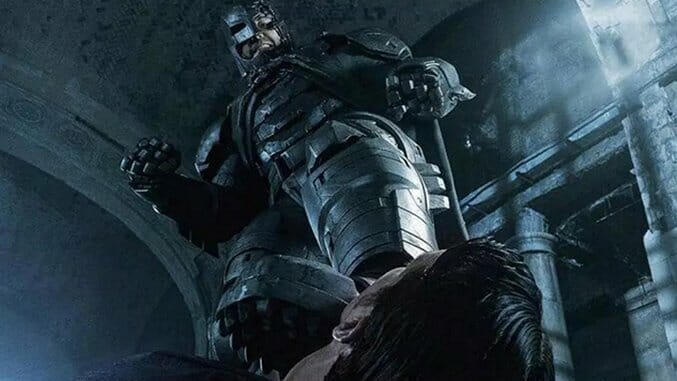Machiavelli Goes to Gotham: Batman v Superman‘s Ultimate Edition
In this, the longer, better version of BvS, more focus is placed on those whom our heroes are supposed to be protecting in the first place.

In the “Ultimate Edition” of Batman v Superman: Dawn of Justice, there is a brief sequence of scenes which twists all the film’s sprawling thematic threads into an ambiguous, amoral knot. Improbably, it begins with Jon Stewart. In his cameo, Stewart delivers a brief monologue in the style of The Daily Show that riffs on the idea of Superman (Henry Cavill) no longer wanting to be seen as an American hero. Stewart suggests that this might be difficult, since Superman has the red and blue on his uniform, and an “S” (as in USA) on his chest. We notice that there is no audience reaction to this monologue, either because they neglected to add it in post-production or because Stewart’s jokes aren’t funny.
What’s more interesting is how the camera pulls back to reveal that the program is being watched by an anonymous kitchen worker. When his boss tells him to forego the indulgence of Stewart’s post-ironic liberalism in favor of serving champagne to the rich folks up above, he obeys, leaving the question of Superman’s national identity to those with the luxury to debate it—those like Bruce Wayne (Ben Affleck) and Diana Prince (Gal Gadot), for example, two of the aristocrats partaking of that champagne at a higher elevation.
This kind of thing happens a lot in the longer, better version of BvS that was recently released to home video along with the theatrical cut. Our heroes and anti-heroes cede the screen, if only for a moment, so that the less powerful and influential can remind the viewer whom these superhuman gladiators are supposed to be protecting in the first place.
Often these common folks remain anonymous, like the victims of Batman that Clark Kent interviews in Gotham’s ghettos and prisons. But sometimes the film gives them names: Wallace Keefe (Scoot McNairy), who is made paraplegic by Superman’s destructive metropolitan battle from the end of Man of Steel; Kahina Ziri (Wunmi Mosaku), who gives testimony to Holly Hunter’s fiery Senator Finch on the subject of Superman’s war crimes in her (fictional) home country of Nairomi. That both of these characters meet tragic ends is no accident. Their grievances about Superman appeal to international policy and ethical principle, but as another Nairomian character (General Amajagh, played by Sammi Rotibi) reminds us in the extended cut, “Men with power obey neither policy nor principle. No one is different, no one is neutral.”
This Machiavellian point is made with a little more poetry in the moment where Batman and Wonder Woman first sip champagne together. This scene is partially intact in the theatrical version of the film, but the extended cut gives it more time and emphasis. (This is often the main difference between theatrical and director’s cuts, and it’s not insignificant: Time carries a lot of weight in film.) Diana Prince is invited by a covetous museum curator to look at his prize possession, which he earnestly believes to be the sword Alexander the Great used to cut the Gordian Knot. In the popular version of this legend, Alexander comes to a Phrygian town whose big tourist attraction is a former king’s ox cart that had been sanctified and tied to its pole for centuries. Alexander, unable to untie the knot after much effort, opts for a more direct solution: he takes out his sword and cuts the rope in half.
-

-

-

-

-

-

-

-

-

-

-

-

-

-

-

-

-

-

-

-

-

-

-

-

-

-

-

-

-

-

-

-

-

-

-

-

-

-

-

-








































